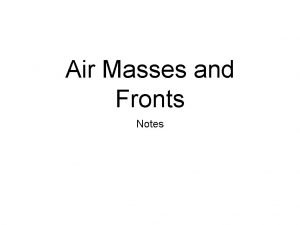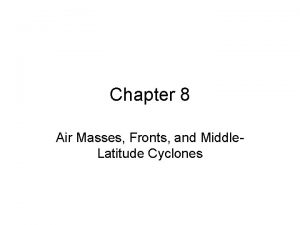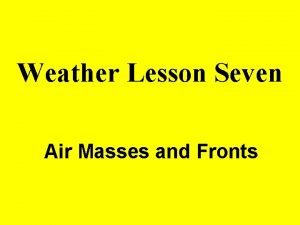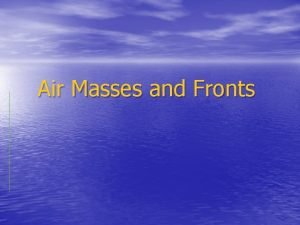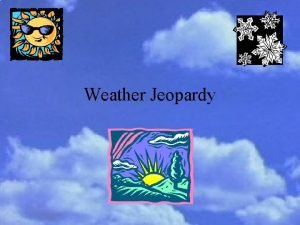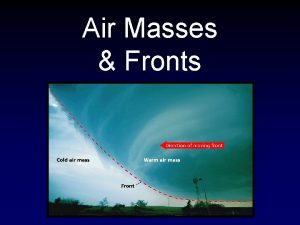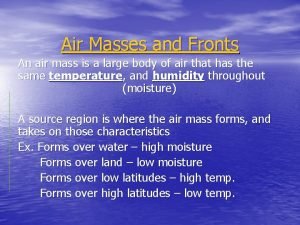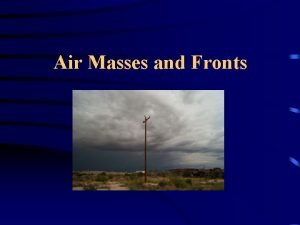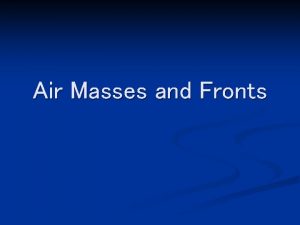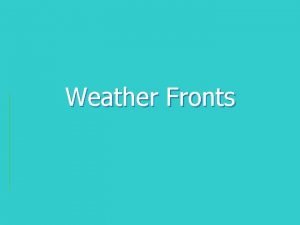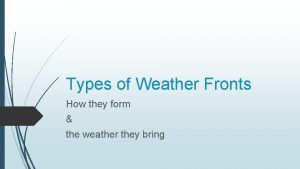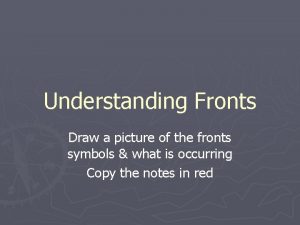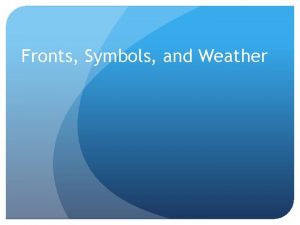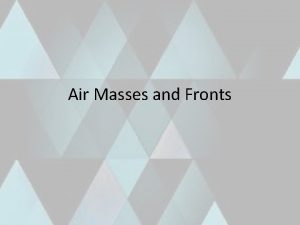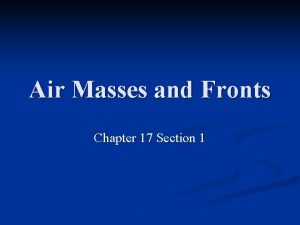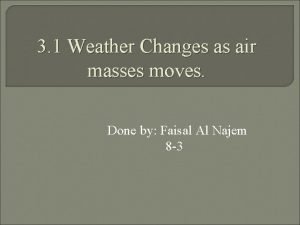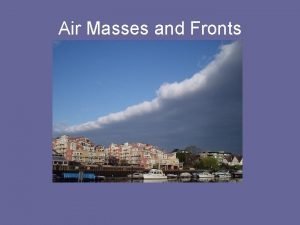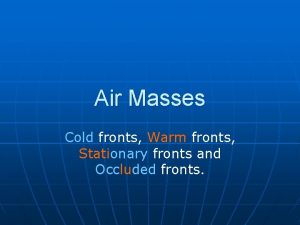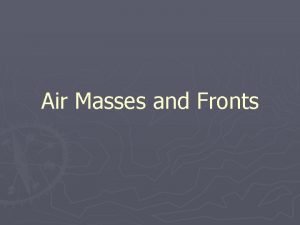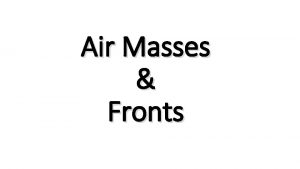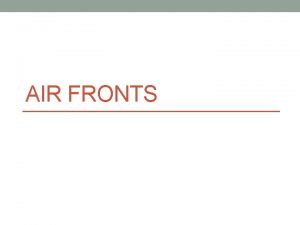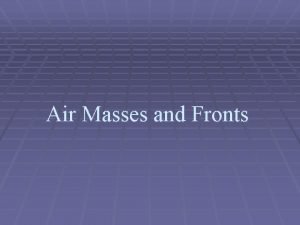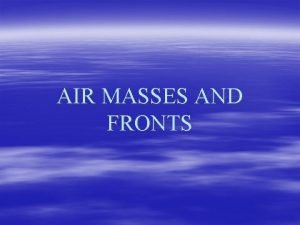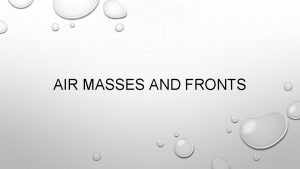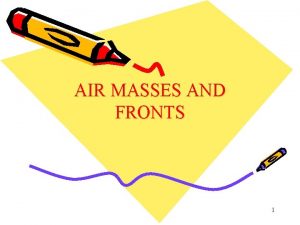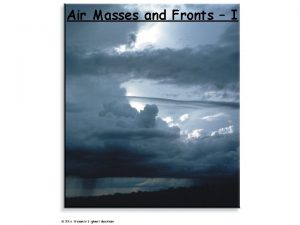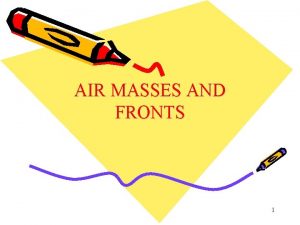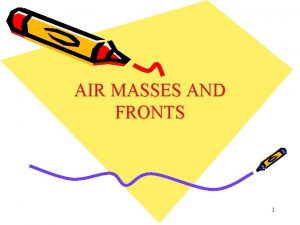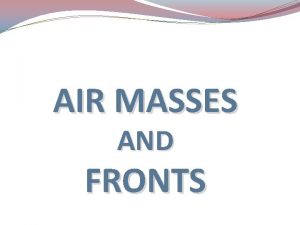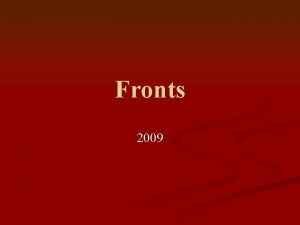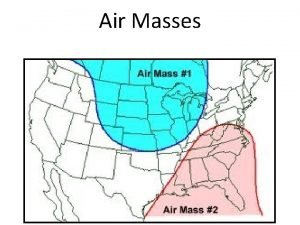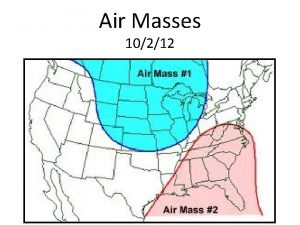Weather Fronts Air Masses Changes in weather are




















- Slides: 20

Weather Fronts

Air Masses ▪ Changes in weather are caused by the movement of and interaction of air masses. ▪ Large bodies of air with similar temperature and moisture that form over large land or water masses

▪ Air masses are characterized by their moisture content and temperature. ▪ Moisture content and temperature are determined by the area they form over. ▪ These areas are called source regions.

Identifying Air Masses ▪ Represented by two letter symbols. ▪ First Letter Indicates moisture content. ▪ The second letter represents temperature. ▪ ▪ Maritime (m): forms over water: wet Continental (c): forms over land: dry Polar (p): forms over poles: cold Tropical (t): forms over tropical areas: warm


Fronts ▪ Where air masses interact ▪ 4 kinds of fronts: ▪ ▪ Cold front Warm front Occluded front Stationary front

Four Types of Fronts

Warm Front ▪ Warm air mass replacing a cooler air mass ▪ Shown on a weather map by a red line with half circles pointing the direction the warm air is moving.

Cold Front ▪ cold air mass is replacing a warmer air mass ▪ Shown on a weather map by a blue line with triangles pointing the direction the cool air is moving.

Comparing Warm and Cold Fronts ▪ Cold fronts move faster than warm fronts. ▪ The weather activity in a cold front is often violent and happens directly at the front. ▪ Cold fronts have sudden gusty winds high in the air creating turbulence. ▪ The weather activity in a warm front generally happens before the front passes.

Occluded Front ▪ warm front is trapped by 2 cold fronts ▪ Shown on a weather map by a purple line with alternating triangles and semicircles pointing the direction the front is moving.

Stationary Fronts ▪ A front that stops moving or is moving very ▪ slowly Shown on a weather map with alternating red semicircles pointing away from the warm air and blue triangles pointing away from the cold air.

Air Pressure and Weather ▪ High Pressure = Happy Weather (Clear) ▪ Low Pressure = Lousy Weather (cloudy, rain)

Locate the 4 types of fronts on this weather map.

Cold Fronts

Warm Front

Stationary Front

Occluded Front

Be a Weather Forecaster You are planning to travel to Alabama in 2 days. The high temperature there for today is 68º F. Use the map to help you predict whether the temperature in Alabama will increase, decrease, or stay the same. Explain why you think so.

Be a Weather Forecaster There is a cold front approaching. The temperatures will probably be cooler behind the front.
 Low pressure air mass
Low pressure air mass Air masses in north america
Air masses in north america What are middle-latitude cyclones?
What are middle-latitude cyclones? Insidan region jh
Insidan region jh North american air masses
North american air masses Maritime tropical air mass symbol
Maritime tropical air mass symbol Air masses & frontswhat is an air mass?
Air masses & frontswhat is an air mass? Two cold air masses converge on a warm air mass
Two cold air masses converge on a warm air mass A swirling center of low air pressure is called
A swirling center of low air pressure is called Air masses & frontswhat is an air mass?
Air masses & frontswhat is an air mass? Air masses & frontswhat is an air mass?
Air masses & frontswhat is an air mass? Air masses & frontswhat is an air mass?
Air masses & frontswhat is an air mass? Air masses & frontswhat is an air mass?
Air masses & frontswhat is an air mass? Warm front animation
Warm front animation Weather front types
Weather front types Draw a warm front
Draw a warm front Weather fronts symbols
Weather fronts symbols Types of air masses
Types of air masses Air masses form in the tropics and have low pressure
Air masses form in the tropics and have low pressure Tropical air masses
Tropical air masses Importance of air masses
Importance of air masses
